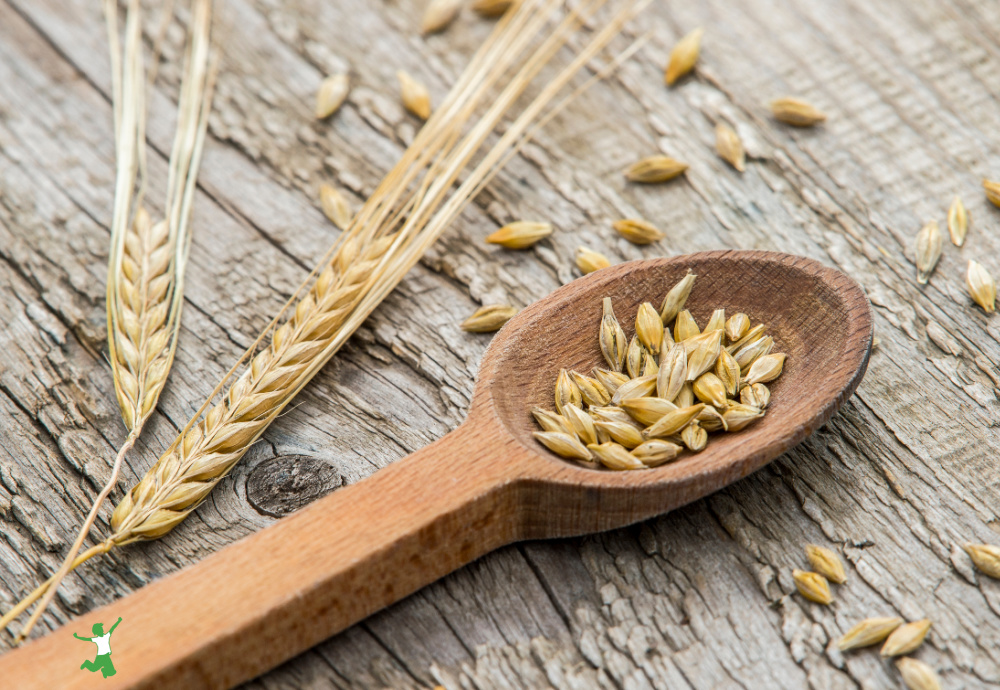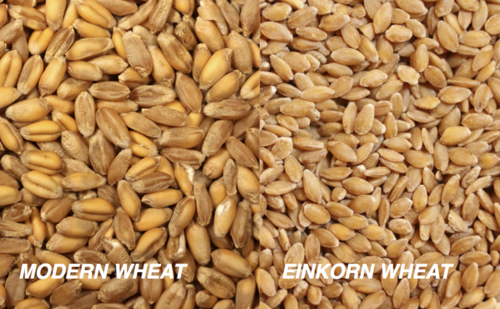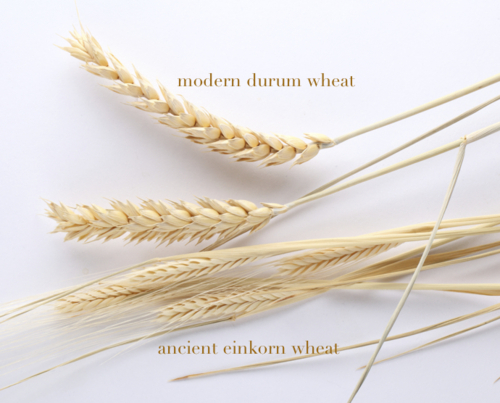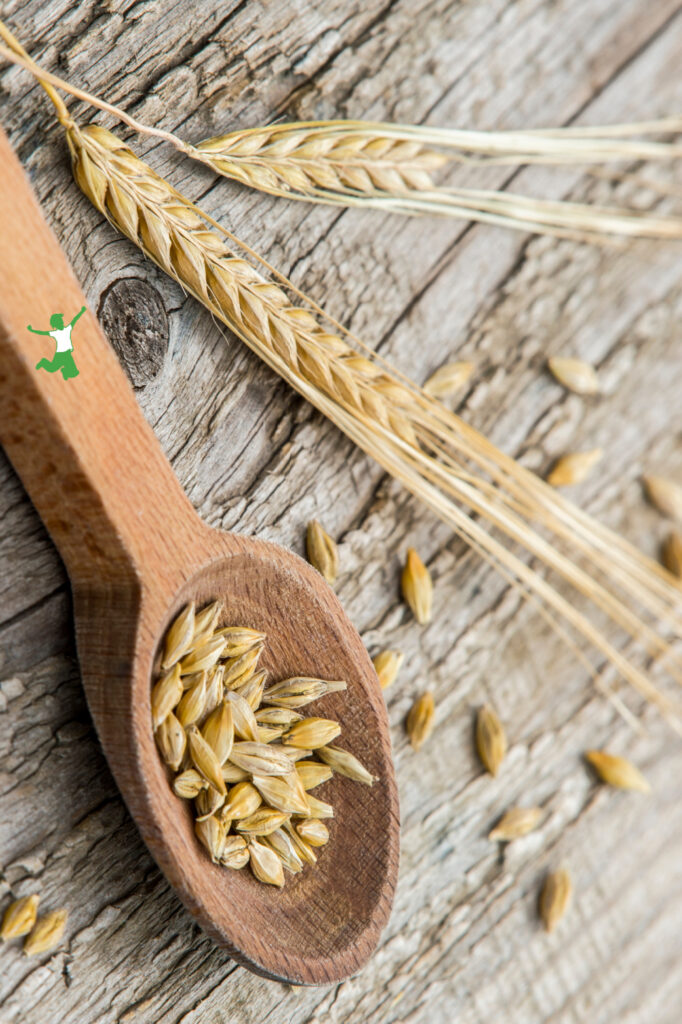There are four big reasons why einkorn is, by far, the best form of wheat to eat even when compared to other ancient grains like spelt, emmer, and kamut.

Most people who love to bake bread, pastries, and other goodies do not realize that einkorn is the best type of wheat to use.
Twenty-five or so years ago, I used to purchase organic white wheat (hard and soft) and spelt in bulk from a local grain co-op for my baking endeavors.
Grinding grain into fresh flour is certainly the most nutritious and tastiest way to bake! I also did this to avoid the conventional toxic wheat desiccated with gut-destroying glyphosate.
Caveat: Baking with freshly ground flour is only better if the bread is traditionally prepared.
Otherwise, the antinutrients like phytic acid are not broken down and harm to gut health is likely over time.
There certainly is a huge difference between modern processed wheat (hybridized by irradiation) and the organic, ancient grains you grind yourself at home.
I remember when I was breastfeeding my youngest child, if I ate so much as a mouthful or two of processed wheat at a restaurant, she would spit up for one or sometimes even two days!
If I ate organic wheat that I ground myself and either sprouted, soaked, or sour-leavened (sourdough), however, she never had any spit-up issues.
To me, this was a huge testament to the radically improved digestibility of wheat that is prepared using the wise methods of ancestral cultures.
Beware of persuasive influencers who claim that all you need to do is grind freshly ground flour and bake bread with baker’s yeast with no proper preparation such as soaking, sprouting or sour-leaving the dough necessary.
This approach is not how traditional societies ever baked their bread, and it is a recipe for serious gut issues!
Most people do not know that baker’s yeast is actually a modern invention only used in the past few centuries!
It quickly gained traction because it made baking faster and easier (NOT healthier). This is the case even when using freshly ground flour!
These quick rise breads using baker’s yeast gradually displaced traditional sourdough to the detriment of those who embraced this early “modern” cooking convenience.
Einkorn Benefits over Modern Wheat
With traditional baking the way to go (using a sourdough starter and NOT baker’s yeast), let’s talk about einkorn as the best type of wheat to bake with.
There are four reasons why I prefer to bake with einkorn wheat and no other type of ancient grains.
This isn’t to say I never use anything else, but if given the choice, I prefer to use einkorn.
Note that einkorn is not to be confused with farro or heirloom wheat.
Better Taste
My first experience baking with einkorn occurred after I received a thoughtful gift of, among other things, einkorn flour and wheat berries. I was delighted when I ground the einkorn into flour and saw how light and white it was.
I am not a fan of bran and am not of the food philosophy that all that fiber is actually good for your gut.
Fiber is a band-aid that covers up the root causes of constipation, a very common symptom of gut imbalance.
I recommend the book Fiber Menance as a good read on the subject.
The truth is that the unhybridized form of wheat…einkorn is the only one…does not have that much bran!
I was thrilled to see that my family thoroughly enjoyed the soaked waffles made with freshly ground einkorn flour.
Later on, I learned to make sprouted einkorn waffles that were more convenient but still highly digestible.
From that point, I gradually incorporated using einkorn for all my baking needs including this very popular no knead sourdough bread recipe.
Most Digestible
Because einkorn is unhybridized and low in bran, it is the most digestible form of wheat you can eat.
While my properly prepared grain dishes made with white wheat or spelt digest fine for our family, you can tell that the same dishes make with einkorn feel even better in the stomach.
This is possibly because einkorn contains good gluten, different on a molecular level from modern gluten in all other forms of wheat including ancient grains like spelt.
Better digestion means better absorption of nutrients, so einkorn surpasses the competition in that category as well.
Visually Distinctive

The first thing I noticed when I ground einkorn into flour for the first time was how much smaller a grain of einkorn is compared with a grain of modern wheat. They are about half the size!
In addition, I noticed that my grain grinder makes less noise when grinding einkorn berries into fresh flour because of softer, low bran kernels.
The distinctive crease on one side of a grain of modern wheat is also absent from kernels of einkorn.
The reason for the differences is that over the centuries, the genetics of wheat gradually changed due to human cultivation practices.
Year after year, farmers selected the seeds at harvest time that suited the goal of higher yields and MORE gluten.
This worked best for big farms and larger-scale agriculture, production, and distribution of wheat products.
The ONLY Unhybridized Wheat

Einkorn is like most plants in that it is diploid.
This means that einkorn contains only 2 sets of chromosomes.
About 2,000 years after einkorn wheat, nature created emmer via the natural hybridization of 2 wild grasses.
Consequently, emmer has 4 sets of chromosomes. Kamut and durum (bulgur) wheat are both descendants of emmer.
Spelt, an heirloom wheat, is the result of hybridization between cultivated emmer and another wild grass. Thus, spelt contains six sets of chromosomes.
Modern wheat is a descendant of spelt.
As you can see, einkorn is the purest and most ancient form of wheat available. With only 2 sets of chromosomes, a very different composition of gluten, and low bran, it is the most digestible form of wheat for baking at home.
Where to Source Quality Einkorn
The only downside of einkorn is that it is not widely available and tends to be more expensive than other types of wheat. It is still quite new to the North American market.
If you are sourcing organic einkorn berries, I recommend this quality brand.
If you need organic sprouted einkorn berries for more convenient baking, this farm based in the United States is my preferred source.
Have you tried einkorn wheat yet? If so, what observations have you made about this ancient, unhybridized wheat?









how is this for gluten problems?
The recipe, please!!
Do you know a place where I can buy sprouted einkorn flour?
I got some Einkorn flour a couple weeks ago, and use it sparingly. Yesterday, I made pizza dough using the recipe on Jovial’s website. WOW!!!!!! Since I don’t have a stand mixer, I made it by hand. It was the MOST BEAUTIFUL dough I have ever handled! I loved it. The taste was sensational, and the after-effects of eating it made me feel great! Like Sarah, I will be making the switch. It does rise faster, and it seems I did not have to use as much flour to get a good texture.
I made the pizza dough today to make mini pizzas and the crust came out more like crackers. That was my fault; I did not pay attention to the timer. ANYWAY, I found it strange that the Jovia recipe calls for 4 cups of flour where a “traditional” pizza dough recipe would only call for 2.5 cups. Did you use the full 4 cups? I found the dough came together nicely with a fraction of the 4 cups called for in the recipe.
Do you know if Einkorn is considered soft or hard wheat, i.e., can it be used for bread and/or baking?
R
Einkorn is very soft but I think it would make an amazing sourdough (haven’t tried that yet). I was surprised at how much less noise my grinder made when it was being ground into flour.
I made brownies with it over the weekend with einkorn flour (for my birthday, happy birthday to me!) and they were TO DIE FOR.
Dr. Davis did an experiment with this, and I think he still opted to skip it due to blood sugar concerns, even though he did not get all of the same side effects of modern wheat. I am sure it would be fine for me on occasion, but I would be scared to even attempt it with the boys.
@Carrie read one of the the last comments on the blog from a woman whose family is very intolerant of gluten with terrible symptoms from consuming it and what they’ve experienced with einkorn.
Very interesting.. I read all the comments and I’m intrigued… I’m doing GAPS right now for my gluten sensitivity (I’m not celiac) and currently I can’t have any grains (whether GF or not). I’m hoping to maybe use this flour to do a sourdough bread and try that after I’ve healed.
Also as to the expense of different foods. My philosophy is that you should focus on purchasing the real foods and maybe even eat a little less than to purchase non-real foods or not good for you foods. We think we need to eat so much but we really are a nation that overeats. We can get by with alot less food if it is nutrient-dense. I am so much more satisfied after a nourishing meal.
Hi Sarah, have you used the rye to feed your sourdough starter and would you continue to do that? And then add the einkorn instead of spelt when you are ready to bake. If this is the way you traditionally prepare your wheat. Or how would you change doing the sourdough?
To chime in – I love the einkorn sourdough. I do not follow the directions on Jovial though – too hard and work intensive and it is so thick. I use the traditional method of flour and water and it is so good! I did not use any rye – just the einkorn flour.
I followed the directions on gnowfglins.com I just did not discard half each time – I used it. Poured it right into a pan heated with lots of coconut oil and cooked like a pancake on both sides. And ate it! No way am throwing out ANY $3/pound flour. Geez!